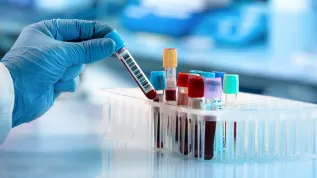
Innovative selection of the type of meat, additives and manufacturing technology has been patented by scientists from inter-university team coordinated by the Institute of Genetics and Animal Breeding PAS and Warsaw University of Life Sciences. The researchers obtained meat products with reduced allergenicity and increased content of selenium and polyunsaturated fatty acids. The invention won international awards.
The patent is titled "Method of producing pork products with controlled allergenicity". Meat prepared according to the procedure retains all the characteristics associated with the appearance, smell and taste, which consumers care about.
"In the production of controlled allergenicity products we do not use beef additive, nor structure-shaping additives such as proteins, isolates and soy concentrates. Soybean derivatives have been replaced with an extract of red algae and porcine blood plasma proteins" - explained co-author of the solution Dr. Maciej Kuboń.
He added that spices containing allergenic compounds such as flavour extracts of shellfish, fish, peanuts, soy protein hydrolyzate, mustard, sesame and celery were replaced with spices having the same or very similar olfactory and taste characteristics, but not containing allergenic compounds.
Members of the team of inventors were: Agnieszka Wierzbicka, Krystyna Gutkowska, Jarosław Horbanczuk, Monika Marcinkowska- Lesiak, Ewa Polawska, Andrzej Półtorak, Jarosław Wyrwisz, Dominika Guzek, Cyprian Tomasik and Maciej Kuboń .
Dr. Kuboń noted that in Poland, Europe and worldwide the problem of food allergies is becoming more common and affects a substantial part of the population, people diagnosed with food allergies. Allergic diseases are one of the main health problems due to, among others, chronic and recurrent nature and severe clinical course. The level of food intolerance in children is 6-8 percent, in adults it is 1-3 percent of the population diagnosed with allergies. It is a significant proportion of patients requiring nutrition products free of allergenic compounds.
Another problem, to which researchers draw attention, is obesity. According to FAO/WHO and to Eurostat, the percentage increase in obesity in the world, in Europe and in Poland will significantly grow. Products with a high fat, high salt and high calorie have a low nutritional value and low quality. Diet-related diseases have gained the status of lifestyle diseases. These include overweight, obesity, hypertension, diabetes, arteriosclerosis. Their causes often appear in childhood. Inventions aimed at changing eating habits are therefore very important for the society.
The second patent of Dr. Kuboń is "Packing healthy pork products". The invention shows how to pack meat products with high nutritional value, reduced fat , reduced calorie, reduced salt and no polyphosphates, as well as controlled allergenicity.
The products are packed in a container with a barrier layer which is made from specially optimised thickness EVOH copolymer, which protects products against deterioration. Both the outer and the inner layer uses polypropylene that provides a barrier to water vapour. The researcher also determined the atmosphere in which the packaging process should be carried out. Dr. Kuboń stressed that by selecting a proper packaging atmosphere, multilayer film with a relatively small thickness can be used.
Experiments have shown that this arrangement prevents the development of harmful microflora. The colour and flavour of products with high nutritional value remain unchanged for a long period. The meat retains its freshness, despite reduced fat, salt and lack of polyphosphates.
The packing method has been developed by: Agnieszka Wierzbicka, Krystyna Gutkowska, Jarosław Horbanczuk, Dominika guzek, Ewa Polawska, Andrzej Póltorak, Monika Marcinkowska-Lesiak, Jarosław Wyrwisz, Cyprian Tomasik and Maciej Kuboń.
Patents received gold (meat recipe) and silver (packing) medals at Brussels Innova 2013 and a gold medal and special certificate at the International Invention Fair in Croatia.
***
Dr. Kuboń is an assistant professor at the Faculty of Engineering, Manufacturing and Energy, Institute of Agricultural Engineering and Informatics of the University of Agriculture in Kraków. Since 2011, he cooperates with the Warsaw University of Life Sciences in two EU research projects. The first is the "Optimisation of beef production in Poland in accordance with the strategy - from the fork to the farm", the second is "BIOFOODS - innovative, functional animal products".
Main scientific and research interest of Dr. Maciej Kuboń concern organization and economics of transport, use of modern methods and technology of transport, logistics and its impact on the functioning of agri-food industry, and modelling of agricultural production processes in the production of cereals and meat products and ready-made products with the entire supply logistics.
PAP - Science and Scholarship in Poland
kol/ ula/
tr. RL













